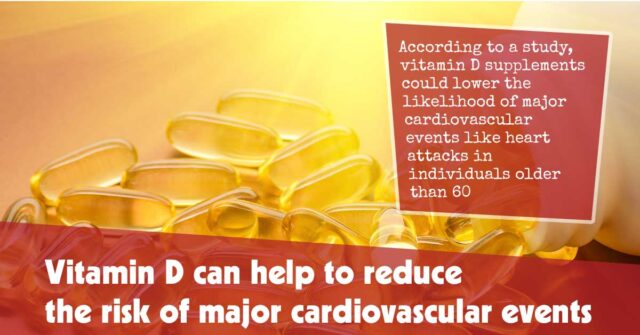Cardiovascular
Vitamin D Reduces Risk of Cardiovascular Events
Vitamin D Supplements May Lower Risk of Major Cardiovascular Events in Older Individuals
According to a recent study published in the British Medical Journal, vitamin D supplements could potentially reduce the likelihood of major cardiovascular events, such as heart attacks and strokes, in individuals over the age of 60. While the overall risk difference was small, the findings suggest that further investigation is warranted, particularly for individuals who are already taking statins or other medications for cardiovascular disease.
Cardiovascular disease is a broad term that encompasses various conditions affecting the blood vessels and heart. It is one of the leading causes of death worldwide, and as populations continue to age and chronic diseases become more prevalent, the incidence of cardiovascular events is expected to rise.
Previous observational studies have consistently shown a link between vitamin D levels and the risk of cardiovascular disease. However, randomized controlled trials have not provided conclusive evidence that vitamin D supplementation can prevent such events. This discrepancy may be due to differences in study design and methodology.
To address this gap in knowledge, researchers conducted the D-Health Trial, which involved 21,315 individuals between the ages of 60 and 84. Participants were randomly assigned to receive either a placebo or a monthly dose of 60,000 IU of vitamin D for a period of five years.
Individuals with certain pre-existing conditions, such as kidney stones, hypocalcemia, osteomalacia, hyperparathyroidism, sarcoidosis, or those already taking high doses of vitamin D, were excluded from the study.
The researchers analyzed hospital admission and death data to identify major cardiovascular events, including strokes, heart attacks, and coronary revascularization procedures. The average duration of treatment was five years, and over 80% of participants reported taking at least 80% of the prescribed capsules.
During the study period, 1,336 individuals experienced a major cardiovascular event. The incidence rate was 6% in the vitamin D group and 6.6% in the placebo group. This translates to a 9% lower risk of major cardiovascular events in the vitamin D group, equivalent to 5.8 fewer events per 1,000 individuals.
Furthermore, the rate of coronary revascularization was 11% lower, and the rate of heart attacks was 19% lower in the vitamin D group compared to the placebo group. However, there was no significant difference in the incidence of strokes between the two groups.
Although there was some indication of a more pronounced effect in individuals using statins or other cardiovascular medications at the start of the study, these results did not reach statistical significance.
Based on the findings, it was estimated that 172 individuals would need to take monthly vitamin D supplements to prevent one major cardiovascular event.
The researchers acknowledged that there might be a slight underestimation of cardiovascular events and that the results may not be applicable to other population groups, particularly those with a higher prevalence of vitamin D deficiency.
In conclusion, this study suggests that vitamin D supplementation may help reduce the risk of major cardiovascular events, especially in individuals already using statins or other cardiovascular medications. However, further research is needed to confirm these findings and explore the potential mechanisms underlying this protective effect.
It is important to note that while vitamin D supplements may have potential benefits for cardiovascular health, it is always advisable to consult with a healthcare professional before starting any new supplement regimen. Additionally, maintaining a healthy lifestyle, including regular exercise, a balanced diet, and regular medical check-ups, remains crucial for overall cardiovascular health.

